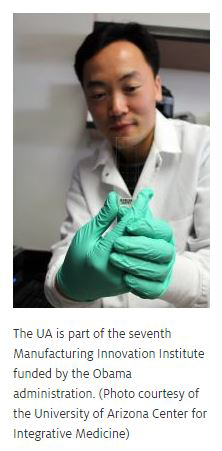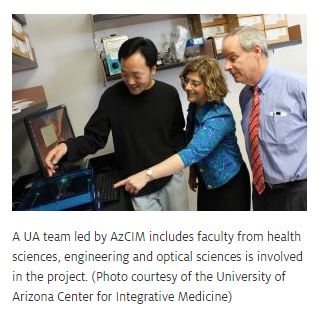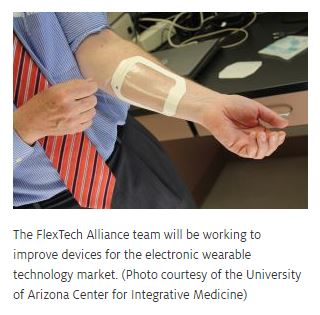University of Arizona researchers are part of a national team selected to further flexible hybrid electronics research that could reshape entire industries, from the electronic wearable devices market, to medical health monitoring systems, to the ubiquitous sensing of the world around us.
 The U.S. Department of Defense has awarded FlexTech Alliance(link is external), the organization the UA has been working with since 2013, a cooperative agreement to establish and manage a Manufacturing Innovation Institute, or MII, for Flexible Hybrid Electronics, or FHE MII. The award is for $75 million in federal funding over a five-year period and is being matched by more than $96 million in cost sharing from non-federal sources, including the city of San Jose, California; private companies; universities; several U.S. states; and not-for-profit organizations.
The U.S. Department of Defense has awarded FlexTech Alliance(link is external), the organization the UA has been working with since 2013, a cooperative agreement to establish and manage a Manufacturing Innovation Institute, or MII, for Flexible Hybrid Electronics, or FHE MII. The award is for $75 million in federal funding over a five-year period and is being matched by more than $96 million in cost sharing from non-federal sources, including the city of San Jose, California; private companies; universities; several U.S. states; and not-for-profit organizations.
"This announcement attests to the high quality of our faculty and our alignment with the pressing needs of our nation's manufacturing sector," said Kimberly Andrews Espy, senior vice president for research at the UA. "The UA has a long, distinguished record of partnering with industry to positively impact our nation's competitiveness.”
The work of the UA team – led by the University of Arizona Center for Integrative Medicine, or AzCIM, research team and including faculty from health sciences, engineering and optical sciences – was the top demonstration project listed in the winning FHE MII proposal. That wording includes research being done by AzCIM at the UA College of Medicine – Tucson to assess and identify biomarkers noninvasively under a variety of human-body conditions, the results of which will help determine the best method for integrating human responses into wearable sensor systems.
"It is tremendously exciting to be part of this historic public-private partnership linking so many fields of research and institutions spanning the DoD, the private sector and academe," said Dr. Esther Sternberg, director of the UA Institute on Place and Wellbeing and research director at AzCIM. "Our team's success and role in helping win this MII is a testament to the vision of UA leadership and the leading scientific expertise and collaborative ecosystem at UA."
 The new flexible technology institute is part of the National Network for Manufacturing Innovation(link is external) program, or NNMI. The NNMI program is an initiative of U.S. President Barack Obama's administration to support advanced manufacturing in the U.S. Each institute is part of a growing network dedicated to securing U.S. leadership in the emerging technologies required to win the next generation of advanced manufacturing.
The new flexible technology institute is part of the National Network for Manufacturing Innovation(link is external) program, or NNMI. The NNMI program is an initiative of U.S. President Barack Obama's administration to support advanced manufacturing in the U.S. Each institute is part of a growing network dedicated to securing U.S. leadership in the emerging technologies required to win the next generation of advanced manufacturing.
This is the seventh MII funded by the Obama administration as part of its drive to build innovation hubs around the country, and the second where the UA has been on the winning team. In July, the UA was part of a national team to receive $110 million to launch the MII Photonics Institute.
"The U of A continues to show it is a top research and development institution in the country. Earlier this week, it was my pleasure to be in attendance when Uber announced it was partnering with the university to locate its new driverless mapping technology here," said U.S. Rep. Martha McSally. "I also was pleased to support the university's FlexTech proposal to the Department of Defense and am glad to see the administration recognize the incredible innovation asset we have in southern Arizona."
FlexTech Alliance, a research consortium and trade association, successfully proposed a San Jose-based hub and node approach to create the FHE MII, which comprises 96 companies, 11 laboratories and nonprofits, 42 universities, and 14 state and regional organizations. The UA is the only university in the state to be part of the program.
The institute's activities will benefit a wide array of markets, including defense, automotive, communications, consumer electronics, medical devices, health care, transportation and logistics and also agriculture. The institute will distribute R&D funds via competitively bid project calls. Industry-generated technology roadmaps will drive project calls, timelines and investments.
"This partnership will increase our ability to bring flexible, stretchable electronics applications to reality, especially in the area of biomedical sensors," said Jeff Goldberg, dean of the College of Engineering. "We also look forward to increased opportunities for both graduate and undergraduate students, and to developing relationships with the other FlexTech Alliance industry and academic partners."
"The development of wearable devices that support precision diagnostic, therapeutic and preventative health interventions, and the analysis and interpretive use of the health-care 'big data' derived from these technologies, is a strategic strength of the University of Arizona Health Sciences," said Dr. Joe G.N. "Skip" Garcia, UA's senior vice president for health sciences. "This is a wonderful opportunity to leverage this multi-disciplinary, team science in a highly impactful area of translational research."
Additionally, education and training in FHE manufacturing will be emphasized in order to expand the available workforce. A "Flex School" concept will be developed through partnerships with community colleges, teaching and research universities, trade associations, and professional societies.
Michael Ciesinski, president and CEO of FlexTech Alliance, said: "FlexTech is privileged to accept this award from the Defense Department to stand up and lead the FHE MII. Our partners collaborated on a superb proposal that links a national hub in San Jose to a network of centers of excellence throughout the U.S. We are excited by the FHE manufacturing challenge and eager to get operations underway."


